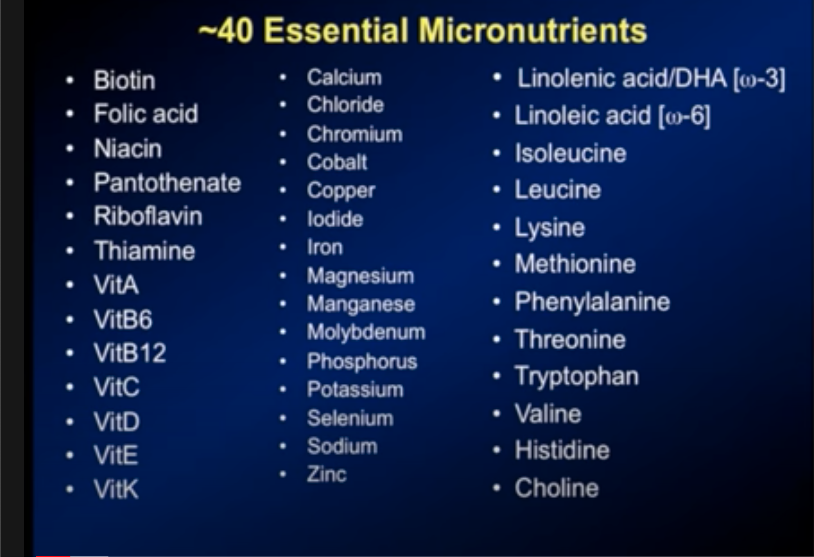Dr Bruce Ames’ Triage Theory explained:
“The triage theory posits that some functions of micronutrients (the approximately 40 essential vitamins, minerals, fatty acids, and amino acids) are restricted during shortage and that functions required for short-term survival take precedence over those that are less essential. Insidious changes accumulate as a consequence of restriction, which increases the risk of diseases of aging.”
In this 2014 presentation, titled, ‘Vitamin and Mineral Inadequacy Accelerates Aging-associated Disease’, Dr Bruce Ames discusses experiments conducted by himself and colleagues. All of which have been under-appreciated. Our understanding of micronutrient shortages could use some tweaks – if we are trying to maximize biological performance (including immune performance).
Some highlights:
Essential Micronutrients
1:58:

On essential fatty acids (omega6s and omega3s):
“It used to be we’d have 1:1 (omega-6:omega-3) ratio – maybe 2:1. But now it’s 17:1, because we’re short omega-3s. So, we’re really in bad shape. The brain is mostly fat. We’re all fat heads, and 30% of your fatty acids are DHA … the one that’s in our brains is found in tuna and salmon – all these deep sea fish. … In general, we should be eating more fish.”
Most vitamin/mineral studies are designed to fail
3:36:
“There’s been recent popularity about some physicians who are saying, ‘look, vitamins have been studied to death. They don’t work. And enough is enough.’ And it’s not true. They just don’t understand nutrition.”
Ames explains the gold standard randomized double-blind clinical trial are designed to fail, because they aren’t measuring the participants vitamin/mineral levels. He explains that in well-designed studies – which do measure – effects are observable.
Micronutrient Undernutrition in America
4:40:

The government sets up committees who establish RDA (recommended dietary allowance) and EAR (estimated average requirement). EAR: if you’re below that the health committee says you’re deficient (or inadequate). Slide above shows percent ingesting below the EAR from all sources. “Why don’t we do anything about that? The reason is we don’t know what is happening, but I’ll tell you what is happening. You’re aging yourself faster.”
Inadequate Folate comparable to radiation
8:35:
Jim McGregor conducted an experiment which Ames said no one paid attention to, but the findings drove his interest in nutrition. McGregor was doing an experiment and noticed all of his control mice were full of chromosome breaks. He began an investigation to determine the cause. He called the makers of the vitamin mix he’d been giving to the mice. It was discovered they’d left out folic acid. “So he did a dose response curve on folic acid. The less folic acid you put in, the more chromosome breaks.”
McGregor continued his research in humans. The findings were published.
“Folate replacement dramatically reversed high levels of micronucleated rbcs in an individual with relatively marginal clinical evidence of folate deficiency. After folate supplementation was stopped, frequencies of micronucleated rbcs again increased in this study subject. … Frequencies of micronuclei are now widely used in toxicologic studies as a measure of chromosomal damage.
“…Our study demonstrates that increased frequencies of chromosomal breakage can also occur in vivo in the setting of clinically unrecognized folate depletion.”
In the video Ames said, “We freak out about a tiny dose of radiation, but we’re eating horrible diets and doing the same thing.”
On establishing a mechanism vs epidemiology
“One of the sciences that’s difficult to do is human epidemiology. They establish an association, and they get the wrong answer half the time. We’re mechanism people. We want to dig down and understand things. I’m not saying epidemiologists aren’t necessary. And there are really good ones out there, but there’s a lot of noise in the system. My epidemiology joke: Studies show Miami is a weird place. Everybody is born hispanic and dies Jewish.”
Cognitive decay and Brain Shrinkage
Ames explained that if you don’t get enough folate or B12, you get homocystein accumulation – which is associated with cognitive decay, brain shrinkage, and heart disease.
I found some of the literature on that.
from Homocysteine and cognitive impairment; a case series in a General Practice setting:
“An elevated blood level of homocysteine is a risk factor for cognitive impairment and dementia. Homocysteine can be lowered by folate and/or vitamin B12 supplementation”
from Homocysteine, B Vitamins, and Cognitive Impairment:
“Most homocysteine-lowering trials with folate and vitamins B6 and/or B12 tested as protective agents against cognitive decline were poorly designed by including subjects unlikely to benefit during the trial period. In contrast, trials in high-risk subjects, which have taken into account the baseline B vitamin status, show a slowing of cognitive decline and of atrophy in critical brain regions, results that are consistent with modification of the Alzheimer’s disease process.”
Inadequate Iron Damages Mitochondria
“Iron shortage tends to damage your mitochondria. And they are the power plants in the cell – burning the fuel and releasing the energy (which he shows also happens to a lesser extend with too much iron)
Zinc and Oxidant Levels
“Zinc deficiency raises the level of oxidants in the cells, and most of these oxidants are mutagens.”
Biotin and Oxidant Levels
“The cells fill up with oxidants when you make them a little biotin deficient.”
Mitochondria Decay Explained
“There are about 500 mitochondria per cell. It’s this organelle that makes energy. It has an outer membrane and an inner membrane and an inside. … Basically, it’s a rechargeable battery. In burning fuel (the Krebs cycle) these complexes, each of which have hundreds of proteins, are passing the electrons along. And every time you pump protons into the inner membrane space, that’s putting charge across the membrane – again like a battery. And those going back in are making ATP – this high energy phosphate form of ATP – which is the thing that drives your muscles and everything else. So these are the power plants. But if an electron gets loose, it reacts with oxygen and makes mutagenic oxidants. So, we’re doing that all the time, and the older you get, the more you make.”

Low micronutrient intake may accelerate the degenerative diseases of again through allocation of scare micronutrients by triage
30:45:
Ames published a paper with that title in 2006.
You’re knocking out your immune system when you don’t eat a good diet

from paper: Folate Deficiency Inhibits the Proliferation of Primary Human CD8+ T Lymphocytes In Vitro:
“These data suggest that folate status may affect the immune system by reducing the capacity of CD8+ cells to proliferate in response to activation.”
“No one said, ‘hey, you’re knocking out your immune system when you don’t eat a good diet. You’re going to get more viruses.’ Nature is trading long term health to favor short term health. … It’s a way of saving micronutrients – by trashing your immune system.”
Benefits of Triage Analysis

Ames discussed two things scientist/entrepreneur friends of his were doing (this was recorded in 2014).
1. Larry Gold in Boulder, CO was able to measure 1,500 proteins from a prick of blood (Ames said he’d soon be able to measure all 3,500 proteins expressed in human blood).
2. (unnamed) uses monocloncal antibodies – which can recognize specific proteins, and he’s taken 20 proteins of known medical importance and measures them all for $10 (also with a prick of blood). He’s talked the Chinese government into subsidizing it, and they’re already in 2,000 hospitals (in 2014). These machines can then report the results to a smart phone.
Ames spoke a future where you test a prick of blood and then a smart phone app can tell you food sources of the micronutrients you need to boost (or supplementation to take).
Half of proteins analyzed are “longevity proteins”
The vitamins and minerals which have been discovered are essential for preventing death.
“What happens if there’s some vitamin out there that’s only involved in longevity? I suspect there’s a whole new class of vitamins we haven’t discovered that only have to do with longevity.”
He’s published a review on that. Title: Prolonging healthy aging: Longevity vitamins and proteins
Top sources of “nutrition” for 20-30 yr olds (in America)

Dr Ames closed the presentation discussing clinical trials of supplement bars he has worked to develop.

